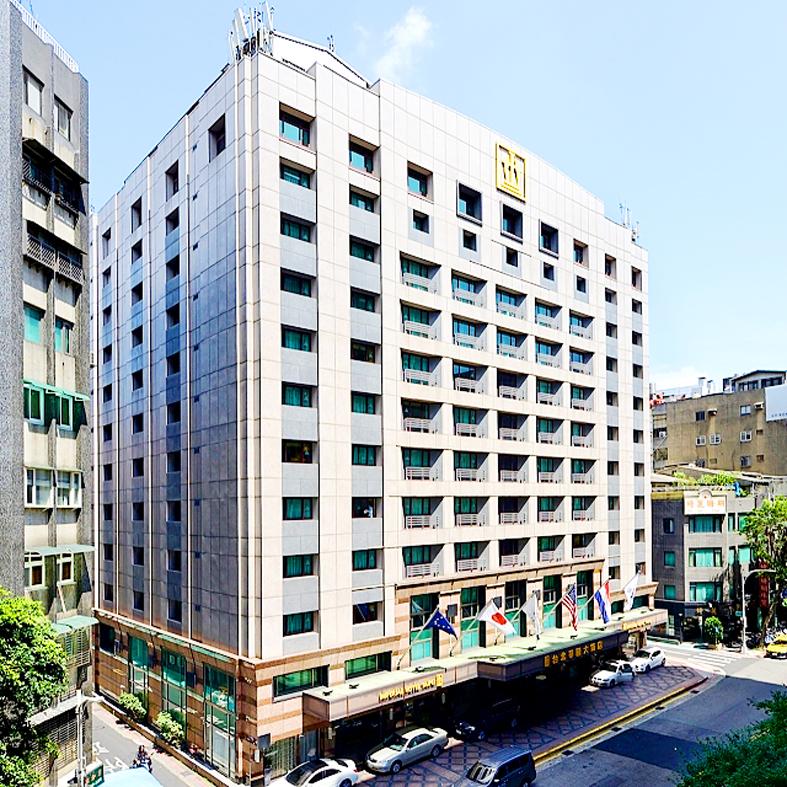Imperial Hotel Taipei (台北華國大飯店) is to shut down at the end of October, succumbing to a business decline induced by social distancing restrictions and border controls to curb a COVID-19 outbreak.
The five-star hotel with 326 guest rooms in the city’s Zhongshan District (中山) yesterday confirmed that it is to terminate its leasing contract with Taiwan Life Insurance Co (台灣人壽) as the outbreak wreaked havoc on its operations.
“We do not see a light at the end of the tunnel,” although the government has conditionally lifted the ban on dine-in services this month, while keeping a tight grip on gatherings and border controls, the hotel’s marketing head, Wu Yun-chia (伍允嘉), told reporters.

Screen grab from the Imperial Hotel Taipei Web site
The 50-year-old hotel and Taiwan Life Insurance decided to part ways after a court mediation last year failed to iron out their differences over rent concession terms.
Imperial Hotel tried to cope with the outbreak by turning the hotel into quarantine facility, but it has failed to curb losses.
A nationwide level 3 COVID-19 alert imposed on May 19 stifled domestic tourism, as well as food and beverage sales.
Although the Central Epidemic Command Center lowered the alert level to 2 late last month, people are still wary of dining out amid fears of lingering local infections.
Wu said Imperial Hotel is looking for a new location to keep its Chinese restaurant, famed for its roast duck cuisine, alive.
It will also press ahead with plans to open a new Imperial Hotel in a mixed-use complex integrated with the MRT Shihlin Station in July 2023, Wu said.
“Business might not improve in the next two years, so the hotel has opted out during the hiatus,” she said.
The backdrop allows the hotel to retain some employees and related details would be released by the end of this month, Wu said.
Formosa International Hotels Corp (FIH, 晶華國際酒店集團) chairman Steven Pan (潘思亮) said he was not surprised by Imperial Hotel’s exit, comparing the hospitality sector to a “critically ailing, but forgotten” patient.
The government has declined to provide wage subsidies as it did last year for hotels dependent on foreign tourists, even though the negative impact of the outbreak is much more serious this time, Pan said on the sidelines of the company’s shareholders’ meeting.
A proposed quintuple stimulus voucher program would be of little help to Taipei-based hotels, as people in the Greater Taipei area — who form the bulk of domestic tourists — prefer to travel to eastern and southern Taiwan, Pan said.
FIH shareholders approved the distribution of a cash dividend of NT$4.39 per share from the conglomerate’s profit last year of NT$733 million (US$26.17 million), or earnings per share of NT$5.18.
The results represented a 47.08 percent decline from a year earlier, dragged by the COVID-19 outbreak.
Pan was re-elected chairman at the board elections.

HANDOVER POLICY: Approving the probe means that the new US administration of Donald Trump is likely to have the option to impose trade restrictions on China US President Joe Biden’s administration is set to initiate a trade investigation into Chinese semiconductors in the coming days as part of a push to reduce reliance on a technology that US officials believe poses national security risks. The probe could result in tariffs or other measures to restrict imports on older-model semiconductors and the products containing them, including medical devices, vehicles, smartphones and weaponry, people familiar with the matter said. The investigation examining so-called foundational chips could take months to conclude, meaning that any reaction to the findings would be left to the discretion of US president-elect Donald Trump’s incoming team. Biden

Intel Corp chief financial officer Dave Zinsner said that a formal separation of the company’s factory and product development divisions is an open question that would be decided by the chipmaker’s next leader. Zinsner, who is serving as interim co-CEO following this month’s ouster of Pat Gelsinger, made the remarks on Thursday at the Barclays technology conference in San Francisco alongside co-CEO Michelle Johnston Holthaus. Intel’s struggles to keep pace with rivals — along with its deteriorating financial condition — have spurred speculation that the next CEO would make dramatic changes. That has included talk of a split of the company’s manufacturing

HOUSING: The uptick to 2.24 percent came despite the central bank leaving its policy unchanged for two quarters and raising lenders’ required reserve ratios Mortgage interest rates last quarter spiked to a 15-year high of 2.23 percent despite a decline in loan applications, as local lenders slowed real-estate lending to support the central bank’s credit controls, Taiwan Realty Co (台灣房屋) said yesterday. “The data suggests that buying a home is growing increasingly difficult,” the brokers said, citing data from the Joint Credit Information Center (聯徵中心). The uptick in mortgage burdens came even though the central bank left its policy rates unchanged in the past two quarters and hiked the lenders’ required reserve ratios to drain money from the market, head researcher Charlene Chang (張旭嵐) said. Further, the

In a patch of South America rich in lithium, used to make batteries for electric cars and other tech, Bolivia is lagging its neighbors in the race to mine the key metal. An area called the “lithium triangle” which spills over the borders of Bolivia, Chile and Argentina is home to 60 percent of the world’s lithium reserves, according to the US Geological Survey. Bolivia claims to have Earth’s largest deposit of the metal, used to make rechargeable batteries for smartphones, laptops and other devices besides e-vehicles. However, Bolivia has undertaken only four pilot projects and is running just one